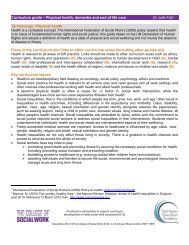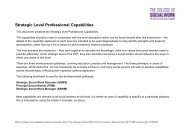PCF capabilities - end of first placement - The College of Social Work
PCF capabilities - end of first placement - The College of Social Work
PCF capabilities - end of first placement - The College of Social Work
You also want an ePaper? Increase the reach of your titles
YUMPU automatically turns print PDFs into web optimized ePapers that Google loves.
Recognise and with support manage the impact <strong>of</strong> own values on pr<strong>of</strong>essional practice.<br />
Identify and, with guidance, manage potentially conflicting values and ethical dilemmas<br />
Elicit and respect the needs and views <strong>of</strong> service users and carers and, with support, promote their participation in decision-making wherever possible<br />
Recognise and, with support, promote individuals’ rights to autonomy and self-determination<br />
Promote and protect the privacy <strong>of</strong> individuals within and outside their families and networks, recognising the requirements <strong>of</strong> pr<strong>of</strong>essional<br />
accountability and information sharing<br />
3. Diversity: Recognise diversity and apply anti-discriminatory and anti-oppressive principles in practice<br />
<strong>Social</strong> workers understand that diversity characterises and shapes human experience and is critical to the formation <strong>of</strong> identity. Diversity is multi-<br />
dimensional and includes race, disability, class, economic status, age, sexuality, g<strong>end</strong>er and transg<strong>end</strong>er, faith and belief. <strong>Social</strong> workers<br />
appreciate that, as a consequence <strong>of</strong> difference, a person’s life experience may include oppression, marginalisation and alienation as well as<br />
privilege, power and acclaim, and are able to challenge appropriately.<br />
Understand how an individual’s identity is informed by factors such as culture, economic status, family composition, life experiences and<br />
characteristics, and take account <strong>of</strong> these to understand their experiences<br />
With reference to current legislative requirements, recognise personal and organisational discrimination and oppression, and identify ways in which<br />
they might be challenged<br />
Recognise and, with support, manage the impact on people <strong>of</strong> the power invested in your role<br />
4. Rights, Justice and Economic Wellbeing:<br />
Advance human rights and promote social justice and economic well-being<br />
<strong>Social</strong> workers recognise the fundamental principles <strong>of</strong> human rights and equality, and that these are protected in national and international law,<br />
conventions and policies. <strong>The</strong>y ensure these principles underpin their practice. <strong>Social</strong> workers understand the importance <strong>of</strong> using and<br />
contributing to case law and applying these rights in their own practice. <strong>The</strong>y understand the effects <strong>of</strong> oppression, discrimination and poverty.<br />
Understand and, with support, apply in practice the principles <strong>of</strong> social justice, inclusion and equality<br />
Understand how legislation and guidance can advance or constrain people’s rights<br />
<strong>Work</strong> within the principles <strong>of</strong> human and civil rights and equalities legislation<br />
<strong>PCF</strong> End <strong>of</strong> First Placement Capabilities V2 November © <strong>The</strong> <strong>College</strong> <strong>of</strong> <strong>Social</strong> <strong>Work</strong> 2012 2-4 Cockspur Street London SW1Y 5BH Company No. 07499397












